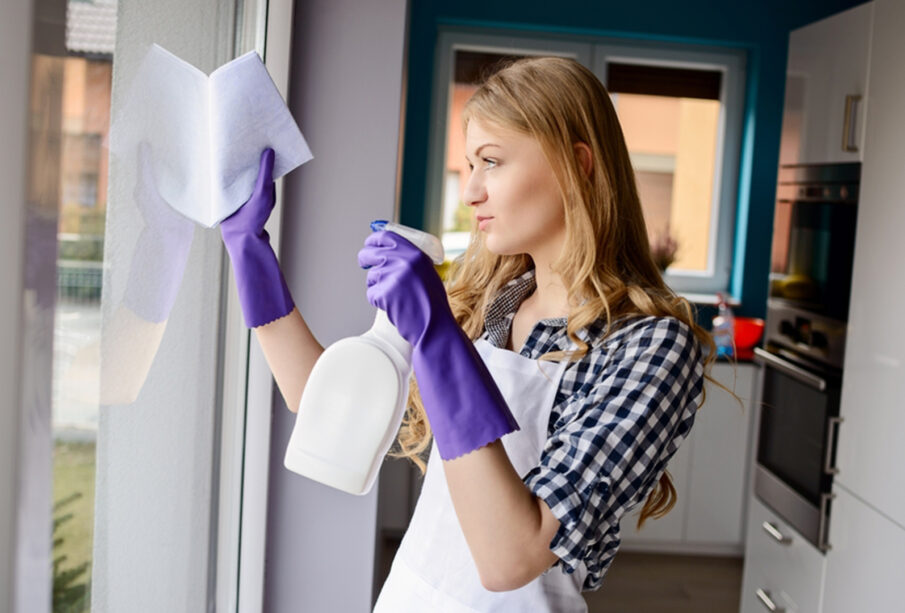The Essential Guide to House Cleaning in NYC: Expert Tips and Tricks

A young woman cleans the window.
Key Takeaways:
- A clean and organized home positively affects our health and well-being.
- Cleaning helps prevent allergies, respiratory problems, infections, and diseases.
- A tidy living space reduces stress, anxiety, and promotes a peaceful mindset.
- Using the wrong cleaning products can damage surfaces, so choose wisely.
- Efficient cleaning involves decluttering, organizing, and using multitasking products.
- Proper kitchen cleaning prevents food-borne illnesses and cross-contamination.
- Bathrooms require regular mold and grime cleaning to prevent health problems.
- Dusting, vacuuming, and using HEPA filters improve indoor air quality.
- Professional organizers recommend decluttering regularly and utilizing storage solutions.
- Schedule deep cleaning for carpets, upholstery, and drapes at least once a year.
- Choose cleaning services based on your needs, like eco-friendly options or specialized cleaning.
1. The Importance of a Clean and Organized Home
A clean and organized home is not just aesthetically pleasing, but it also has a significant impact on our overall health and well-being. Maintaining a clean living space goes beyond the surface level; it helps to eliminate germs, allergens, and pollutants that can negatively affect our health.
Why Keeping a Clean Home is Essential for Your Health
A clean home is crucial for maintaining a healthy living environment. Regular cleaning can help prevent the build-up of dirt, dust, and allergens that can trigger allergies and respiratory problems. By removing these potential health hazards, you can create a safe and comfortable space for you and your family.
Furthermore, a clean home can also reduce the risk of infections and diseases. Germs and bacteria can easily proliferate in unclean environments, increasing the likelihood of illnesses. By practicing good hygiene habits and regularly disinfecting surfaces, you can minimize the spread of germs and maintain a healthier home.
The Psychological Benefits of a Tidy Living Space
A clean and organized home can have a positive impact on our mental well-being. Research has shown that clutter and disarray in our living spaces can contribute to stress, anxiety, and even depression.
When our surroundings are chaotic, it can be challenging to focus and relax. By keeping our homes clean and organized, we create a sense of tranquility and promote a more peaceful mindset. A tidy living space allows us to unwind, be more productive, and experience greater overall satisfaction in our daily lives.
2. Common Cleaning Mistakes to Avoid
Why Cleaning Products Matter: Choosing the Right Supplies
One common cleaning mistake is using the wrong cleaning products for different surfaces. Not all surfaces can handle the same types of cleaners, and using the wrong products can damage or discolor them.
When selecting cleaning supplies, it’s essential to consider the specific needs of each surface. For instance, using abrasive cleaners on delicate countertops can cause scratches, while harsh chemicals may be too strong for certain fabrics or materials.
By understanding the properties of different cleaning products and their compatibility with specific surfaces, you can protect your belongings and ensure effective cleaning without causing any damage.
The Art of Efficient Cleaning: Time-Saving Strategies
Efficient cleaning is not just about being fast; it’s about working smart and maximizing your efforts. One common mistake is not having a plan or a structured approach to cleaning, which can result in wasted time and energy.
To make the most of your cleaning routine, start by decluttering and organizing before you begin. Having a tidy space makes cleaning more efficient as there are fewer obstacles in your way. It’s also helpful to have all your cleaning supplies and tools easily accessible to avoid unnecessary trips back and forth.
Additionally, consider using multitasking products that can serve multiple purposes. For example, a cleaning solution that works well on both glass and countertops can save you time and eliminate the need for multiple products.
3. Effective Cleaning Techniques for Every Room
The Ultimate Kitchen Cleaning Guide: From Countertops to Appliances
The kitchen is one of the most important areas to keep clean due to the potential for food-borne illnesses and cross-contamination. Start by wiping down countertops with a mild cleaner, paying special attention to areas where food is prepared.
When cleaning appliances, consult the manufacturer’s instructions for specific cleaning methods. For example, to remove greasy residue from your oven, you might need a specialized oven cleaner or a mixture of baking soda and vinegar.
Remember to clean behind and underneath appliances, as these areas can accumulate dirt and debris over time. Regularly disinfecting sink fixtures and frequently used utensils can also prevent the spread of harmful bacteria.
Bathroom Cleaning Hacks: Tackling Mold, Grime, and Odors
The bathroom is another area of the home that requires regular and thorough cleaning. Mold and mildew can thrive in damp environments, so it’s crucial to address these issues promptly to prevent health problems.
To tackle mold and mildew, use a mixture of bleach and water to scrub affected surfaces. For stubborn stains, consider using a specialized mold and mildew cleaner. Remember to ventilate the bathroom properly to reduce moisture and prevent future mold growth.
In addition to mold, bathrooms can accumulate grime and odors. Regularly scrubbing toilet bowls, sinks, and showers can help eliminate stains and prevent unpleasant smells. Using a bathroom-specific disinfectant can also provide additional protection against harmful bacteria.
Mastering the Art of Dusting and Vacuuming: Tips for Living Spaces
Dusting and vacuuming are essential for maintaining a clean living space, especially for those with allergies or respiratory conditions. To effectively dust, start at the top and work your way down, using a microfiber cloth or an electrostatic duster to attract and capture dust particles.
When vacuuming, pay special attention to high-traffic areas and ensure you’re using the appropriate attachments for different surfaces. Vacuuming upholstery, curtains, and carpets regularly can help remove allergens and improve indoor air quality.
Consider investing in a vacuum cleaner with a HEPA filter, as these filters are capable of trapping even the smallest particles, providing a more thorough cleaning.
4. Professional Secrets: Cleaning Tips from NYC Experts
Professional Organizing Tips: Simplifying Your Home and Life
Professional organizers in NYC have mastered the art of maximizing space and enhancing efficiency. One of their key secrets is decluttering regularly and embracing minimalist principles.
They recommend categorizing belongings and creating designated spaces for each item. Utilizing storage solutions such as bins, baskets, and shelves can help keep your home organized and clutter-free.
Another professional organizing tip is to adopt a “one in, one out” rule. For every new item you bring into your home, remove an existing item to maintain balance and prevent clutter from accumulating.
Deep Cleaning Strategies: Revitalizing Carpets, Upholstery, and Drapes
When it comes to deep cleaning your carpets, upholstery, and drapes, professional cleaners in NYC have valuable expertise to offer. They recommend scheduling deep cleaning at least once a year to remove deep-seated dirt and allergens.
For carpets, professional steam cleaning is often the most effective method, as it can reach deep into the fibers and extract dirt and stains. Upholstery and drapes can be cleaned using specialized cleaning solutions or through professional dry cleaning services.
Remember to check the manufacturer’s instructions and specifications for each item before attempting any deep cleaning methods to avoid damaging your belongings.
The Hidden Gems of NYC: Cleaning Services Worth Exploring
In a bustling city like NYC, numerous cleaning services cater to different needs and budgets. Whether you’re looking for regular house cleaning NYC, deep cleaning, or specialized services, there are options available to suit your preferences.
Some cleaning companies offer eco-friendly and chemical-free cleaning solutions, ideal for those with sensitivities or environmental concerns. Others specialize in post-construction cleaning or move-in/move-out cleaning services.
Before hiring a cleaning service, it’s essential to do thorough research, read reviews, and compare prices. Additionally, consider contacting multiple providers to inquire about their cleaning methods, equipment, and any additional services they offer.
By investing in professional cleaning services, you can save time and ensure a more thorough cleaning, especially for larger homes or when deep cleaning is required.
In conclusion, maintaining a clean and organized home is essential for our health and well-being. By understanding the importance of cleanliness, avoiding common cleaning mistakes, implementing effective cleaning techniques, and exploring professional cleaning services, you can create a safe, comfortable, and inviting living environment in the bustling city of NYC.
FAQ
Question: Why is it important to keep a clean and organized home? Answer: A clean and organized home positively affects our health and well-being. It helps prevent allergies, respiratory problems, infections, and diseases. Additionally, a tidy living space reduces stress, anxiety, and promotes a peaceful mindset.
Question: How can a clean home contribute to our mental well-being? Answer: Research has shown that clutter and disarray in our living spaces can contribute to stress, anxiety, and even depression. By keeping our homes clean and organized, we create a sense of tranquility, promote a peaceful mindset, and experience greater overall satisfaction in our daily lives.
Question: What are some common cleaning mistakes to avoid? Answer: One common cleaning mistake is using the wrong cleaning products for different surfaces. Not all surfaces can handle the same types of cleaners, and using the wrong products can damage or discolor them. Another mistake is not having a plan or a structured approach to cleaning, which can result in wasted time and energy.
Question: How can I choose the right cleaning products? Answer: When selecting cleaning supplies, it’s essential to consider the specific needs of each surface. For example, using abrasive cleaners on delicate countertops can cause scratches, while harsh chemicals may be too strong for certain fabrics or materials. By understanding the properties of different cleaning products and their compatibility with specific surfaces, you can protect your belongings and ensure effective cleaning without causing any damage.
Question: What are some efficient cleaning strategies I can use? Answer: Efficient cleaning is about working smart and maximizing your efforts. Start by decluttering and organizing before you begin cleaning. Additionally, have all your cleaning supplies and tools easily accessible to avoid unnecessary trips back and forth. Consider using multitasking products that can serve multiple purposes to save time and eliminate the need for multiple products.
Question: How should I clean my kitchen properly? Answer: The kitchen is one of the most important areas to keep clean. Start by wiping down countertops with a mild cleaner, paying special attention to areas where food is prepared. When cleaning appliances, consult the manufacturer’s instructions for specific cleaning methods. Regularly disinfect sink fixtures and frequently used utensils to prevent the spread of harmful bacteria.
Question: How can I effectively clean my bathroom? Answer: To tackle mold and mildew in the bathroom, use a mixture of bleach and water to scrub affected surfaces. For stubborn stains, consider using a specialized mold and mildew cleaner. Regularly scrub toilet bowls, sinks, and showers to eliminate stains and prevent unpleasant smells. Using a bathroom-specific disinfectant can also provide additional protection against harmful bacteria.
Question: How can I improve indoor air quality through cleaning? Answer: Dusting and vacuuming are essential for maintaining a clean living space and improving indoor air quality. Start dusting from the top and work your way down, using a microfiber cloth or electrostatic duster to attract and capture dust particles. Vacuum high-traffic areas and use the appropriate attachments for different surfaces. Consider investing in a vacuum cleaner with a HEPA filter, as they can trap even the smallest particles for a more thorough cleaning.

















